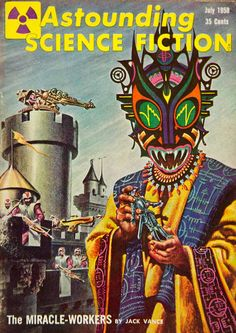The various novels by Vance that I've read were published over a 40 year span:
The Languages of Pao (1958) [at the time, Vance was 42 years old; this was the year before I was born]
Star King (1964)
The Killing Machine (1964)
The Palace of Love (1967)
Emphyrio (1969)
The Pnume (1970) See this blog post.
The Anome (1971)
The Brave Free Men (1972)
The Asutra (1973)
Trullion (1973)
Marune (1975)
Wyst (1978) [the year I discovered Vance; he was 62 years old]
The Face (1979)
The Book of Dreams (1981)
Araminta Station (1989)
Ecce and Old Earth (1991)
Throy (1992)
Night Lamp (1996)
Ports of Call (1998) [Vance was 82 years old]
Lost Worlds
There are several "lost worlds" that Vance used as settings in science fiction stories. The entire Durdane Trilogy concerns a planet that was colonized by humans, then cut off from contact with Earth, then ended up being secretly observed by agents of Earth's Historical Institute some 9,000 years after having first been settled. Ifness is an agent of the Historical Institute, studying the mysterious events that occur on Durdane. On the far fringe of known space, the planet Durdane functions like a "canary in a coal mine", attracting a bizarre alien invasion that can be observed -and countered- by Earth's secret agents.
The protagonist of the Durdane Trilogy is Gastel Etzwane. Vance's plots for the science fiction novels listed above were generally designed around coming of age stories told through the experiences of a young male character such as Gastel (see Gersen, Glinnes and Glawen).
Aliens crop up in other Vance stories, but usually they are not the stuff of Hollywood invasion flicks. For example, on the planet Marune, humans peacefully coexist with the natives (the Fwai-chi). In contrast, the Asutra are parasitical creatures who take control of their human hosts. The planet Durdane is subjected to an invasion by two kinds of alien creatures, one (the Roguskhoi) that impregnates human females causing them to give birth to a clutch of additional aliens and another (the Asutra) that can take up residence inside a human body and take control of the person's brain.
In his Demon Princes series, Vance introduced two other "lost worlds" on the fringe of known space: "Teehalt's Planet" and Thamber. The general idea is that when humans went out into the galaxy and settled distant worlds it was fairly easy for some of the colonized worlds to either be forgotten or kept secret after their initial discovery. In Vance's fictional universe, it is common for terrestrial planets to have intelligent life forms (such as the Fwai-chi) or be discovered holding the ancient ruins of a dead civilization. Vance really liked to play around with the "lost world" literary plot device. Stories about lost civilizations pre-dated the SciFi genre but lost planets provided Vance with settings for several interesting SciFi adventures.
Parasitical Aliens
The science fiction genre has long been parasitized by horror themes. I'm not a fan of horror and most SciFi parasites are not biologically plausible. The idea that two organisms evolved on different planets can meet and quickly establish a host-parasite relationship is silly. In The Asutra, Vance tried to depict the ineptly rampaging Roguskhoi as an experimental bio-weapon, but the whole Durdane Trilogy comes off as an unlikable mixture of vampire fantasy horror jumbled together with a rehash of another of my least favorite types of SciFi stories: an alien invasion where inexplicable alien incompetence assures that blundering humans will survive. The invading Roguskhoi are transported to Durdane by spaceships then they proceed to terrorize the human inhabitants with their swords.
 |
| Fwai-chi |
Gastel Etzwane
 |
| Gastel |
 |
| Roguskhoi |
Swordpunk Fantasy
Vance's writing ranges across multiple genres from mystery to horror to science fiction to fantasy. As mentioned above, the Roguskhoi use swords, which for me is a warning sign that a science fiction author has probably drifted into the domain of fantasy. Vance asks us to believe that if we deliver human colonists to the surfaces of distant planets then the settlers of those worlds are likely to regress and their descendants will undergo social degeneration and end up living in medieval civilizations. In my view, this is just an excuse that allows Vance to slip sword and planet fantasy into a SciFi story.
 |
| source |
 |
| Gersen kills Bel Ruk |
The Two Vances
 |
| The blues. |
Gastel Etzwane remains a mystery to me. He is an emotional cripple, the product of an absurd people (the Chilites of Canton Bashon) who have rigidly defined roles for men and women. All the women are prostitutes, including Gastel's mother and sister.
 |
| Swordpunk |
 |
| light and play |
 |
| source |
_____________________
Related Reading: grimdark





No comments:
Post a Comment